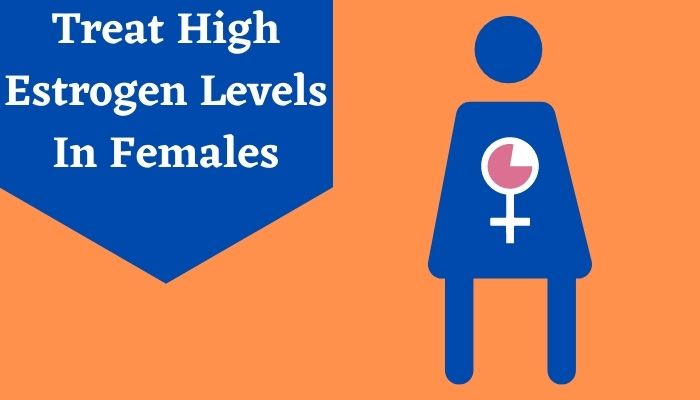Neelam is a 37-year-old woman married for over 10 years. Over the past few months, she is facing irregular menstrual cycles that prolong for over 10 days. She assumed something was wrong and consulted her gynecologist, who did a TVS ultrasound and found that Neelam has uterine fibroids and polyps. Neelam asked what could be the reason for these abnormalities in her uterus? The doctor told her this usually happens due to high estrogen levels, and she has been prescribing treatment for high estrogen in females for such symptoms over the past few decades.
Estrogen or Oestrogen is a female sex hormone, which is mainly responsible for the regulation and development of the female reproduction system. Having this particular hormone in excess or too little quantity can impact a female’s menstrual health and may pose difficulty even in conceiving a baby.
Let us dig deeper and help women like Neelam in treating high estrogen in females with natural remedies. But, before we do that, let’s understand the main causes of high estrogen in females.
Top 7 Causes of High Estrogen in Females
Estrogen dominance or excess in a female’s body may take place due to several reasons such as:1. Stress
One of the major reasons for excessive estrogen production in a female’s body is the stress-generated cortisol hormone, which hampers the body’s production of progesterone, and thereby the estrogen is left unchecked and in excess.2. Alcohol Intake
Women who are regular alcoholics are also found with an excessive estrogen level in their bodies.3. Obesity
Another common cause for excessive estrogen hormone levels in a female’s body is due to fast tissues that secrete estrogen. The higher the fat, the higher would be the estrogen level in a female.4. Liver Issues
When there is an issue in your liver, your body tends to accumulate estrogen instead of breaking it down and your estrogen levels automatically go up.5. Certain Medications
Besides, certain hormone therapy medications like birth control pills tend to sometimes increase the estrogen levels in a woman’s body.6. Dysbiosis
This is a condition that affects the intestine when too much of bad bacteria harms the large intestine. Eventually, this leads to higher production of estrogen in the body.7. Synthetic Xenoestrogens
These xenoestrogens are compounds found in our environment in products like pesticides. These can increase the estrogen levels in a female’s body.Top 10 Side Effects of High Estrogen in Females
Doctors these days prescribe treatment for high estrogen in females medication to help females keep their reproduction system in order. Why is that so? Is there something wrong with high estrogen levels in a female’s body? Yes, the excess estrogen levels in a woman’s body are harmful to her overall health. Due to high estrogen, she can suffer:- Irregular Menstrual CyclesBreast Tenderness
- Decreased Sex Drive
- Mood Swings
- Fatigue and Anxiety
- Sudden Weight Gain
- Uterine Fibroids
- Uterine Polyps
- Ovarian Cancer
- Breast Cancer
- Uterine Cancer
- PCOS or Polycystic Ovarian Syndrome
- Insulin Resistance
- Endometriosis Discomfort or Pain
Diagnosing High Estrogen Levels in Females
To diagnose whether a female has high estrogen levels in the body, a doctor may first ask about her medical history and then prescribe certain blood tests and urine tests. The reports of such tests will reveal whether there is a hormonal imbalance due to excessive estrogen in the body or not.TP 6 Natural Treatment for High Estrogen in Females
Now coming back to what is the best treatment for high estrogen in females? Have a look:1. Reduce Stress Levels
Since the number one cause of high estrogen levels in women is stress. So, we suggest you reduce your stress levels to get rid of problems occurring due to high estrogen.2. Limit Alcohol Intake
If you can’t give up on alcohol completely, try to limit its intake. This will help regulate excess production of estrogen hormone in your body.3. Maintain Body Weight
Another thing is that, obesity is one of the main causes of rising estrogen levels in a female’s body. So, you can regulate estrogen levels naturally by shedding extra weight and maintaining an ideal weight according to your BMI.4. Health Diet
Indulge in a healthy and high-fiber diet to overcome the symptoms of high estrogen production in your body.5. Limit Exposure to Synthetic Xenoestrogens
Up next, we suggest you reduce yourself getting exposure to synthetic xenoestrogens wherever possible. Replace plastic utensils with glass and steel ones and choose organic foods rather than food items loaded with preservatives.6. Exercise Regularly
Exercising regularly keeps your overall health under check and does not just help regulate estrogen levels. So, do workout regularly, some yoga asanas are especially beneficial for female’s reproductive organs, make sure to do those regularly.Read More: List of Top Foods to Increase Estrogen Levels in Body
Treating High Estrogen in Females with Medications
Besides the above-mentioned natural remedies or ways to reduce the high levels of estrogen, doctors sometimes prescribe the following medications for the same:- Gonadotropin-Releasing Hormones Agonists or GnRH: These medications prevent the ovaries to produce estrogen hormone.
- Aromatase Inhibitors: These medicines prevent the fat cells in your body to produce estrogen.



